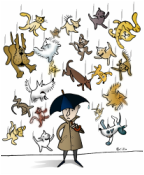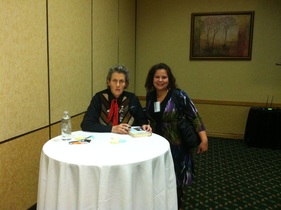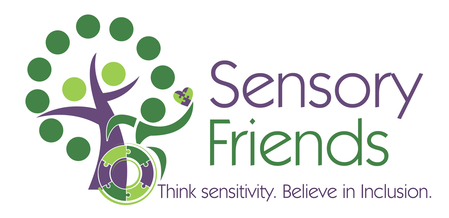
It wasn’t until the sad passing of my son’s grandmother, that I realized what few resources were available to assist our family with explaining the loss to my son, Richie. Richie has autism and relies heavily on the use of pictures for choice making and requests, he also uses gestures and body language for expressing discomfort or happiness, and hand-leading for desired items or activities. Richie, at thirteen-years old, had never lost anyone close to him before. When his grandmother was in the hospital, his father wondered how we would explain this to him.
Even though Richie still struggles with communicating with others, I know my son is smart and understands way more than we give him credit. I also know that he has a difficult time with understanding many things that other children his age might. Children and individuals with autism and some other developmental disabilities have difficulty understanding:

Idioms – “It’s raining cats and dogs.”

And sarcasm – “Wow, that was really funny.”

When explaining things to children with autism, we need to use direct, concrete statements that are to the point. While it may be tempting and sweeter to tell your child that “Grandma has left us to go to a better place,” or “Grandpa is going to sleep for a long time,” these statements will only confuse your child. “Grandma’s heart was not working that good anymore. Then one day it just stopped working and beating.” If your child is non-verbal, try to provide as much concrete information as possible. Death means the heart stopped beating, there’s no more breathing, talking, or movement. Using pictures to help illustrate the point also helps to convey the message for visual learners.
Further explanation about after death will depend on your family’s religious beliefs and traditions. If you wish to explain heaven to your child, make sure to be clear that heaven is not a place you can visit or call. If it’s appropriate and you plan to bring your child to the funeral, a picture book will help him or her understand what to expect. A picture book or social story will help tremendously with explaining the death, funeral, beliefs and traditions of your family. Because so many people have different beliefs, it might be easiest to create your own. I created a simple and short one using PowerPoint:
| good-bye_grandma_dona.pdf |
Please note that some of your family’s traditions may change or interrupt your child’s daily routine, possibly causing behavioral issues as a result. Be sure to have a plan for dealing with certain behaviors and try to have things that comfort your child on hand (iPad, snacks, music, favorite toy, etc.). If the experience is too overwhelming for your child, ask someone you trust well to watch him or her at your home (there is nothing more soothing than the comfort of your own home). If you’re the one hosting the traditional event(s), make sure your child has an opportunity to escape or to be alone if he or she needs to be (if they become overwhelmed).
I know it’s a difficult topic, but please don’t avoid teaching your child about death and loss. Please don’t assume that because your child has a disability or cannot speak that they don’t experience confusion, loss, or emotional distress. Your child will notice that someone important in their life is missing. They’ll need to be reassured that whatever has happened to the loved one won’t happen to you, or other important family members.
We don’t want our children to draw their own conclusions about what’s going on around them. Feelings of confusion about what’s happening around them could potentially increase anxiety and amplify feelings of loss. We want our children to be included in the process along with the family, even though it is a difficult one. We want our children to feel happy, safe, and loved. We want our children to know that although death and loss happens to everyone, they don’t have to worry about losing us anytime soon. Our children need to feel comfort and secure in knowing that they’re going to be in a loving family that they can count on for a long time.



 RSS Feed
RSS Feed